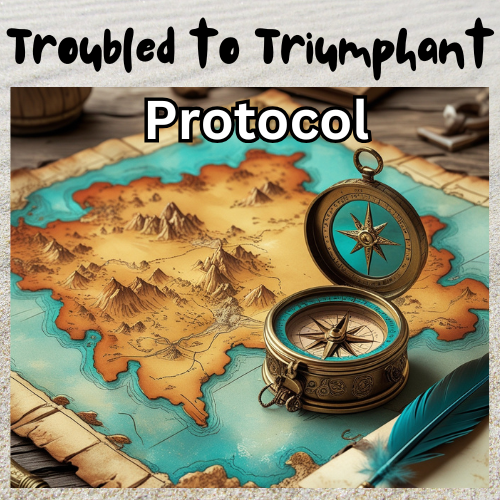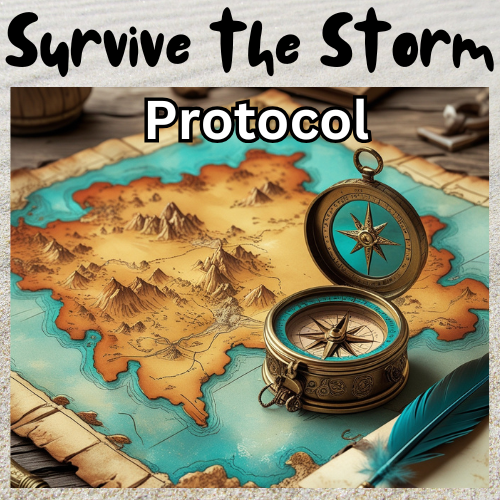Marking the Milestone: Life Transition Rituals for New Beginnings
Rituals can be powerful tools for marking the end of significant life transitions and helping us mentally, emotionally and sometimes physically move from one chapter to the next. Not the spooky, Macbeth’s-three-witches chanting-in-the-woods kind. I mean those little rituals and routines we turn to when life has decided to throw us a curveball, kicked us out of our comfort zones, and tossed us straight into “new chapter” territory. Whether you’re ending an era (goodbye, ramen-every-night phase) or launching a new one (hello, I’ve-got-this phase), rituals can help us move forward, unhindered.
Key Aspects of Rituals
You may be asking yourself, “What exactly qualifies as a ritual?” My understanding is that a ritual is an action or a set of actions performed in a specific sequence, often with symbolic meaning and a sense of purpose. Rituals can be simple or elaborate and are typically repeated regularly, creating a sense of structure and significance. They are often associated with religious or cultural traditions but can also be secular and personal:
- Ceremonial Rituals: Rituals are often part of religious services or ceremonies, involving established procedures that are performed consistently over time. This can include rites such as weddings, funerals, and various forms of worship.
- Cultural Rituals: Beyond religious contexts, rituals can also represent customary behaviours within families or communities, such as weekly gatherings or specific traditions that mark significant events in life. In France, especially the southwest of France, the typical multi-generational Sunday lunch is such a ritual.
- Personal Rituals: These are repetitive behaviours that individuals perform to alleviate anxiety. Examples include morning routines, journaling, or a weekly relaxation routine like a bath with perfumed candles and calming music.
- Transition Rituals: These mark important life changes, like moving to a new home, starting a new job, or significant life transitions like marriage, retirement, or divorce.
Rituals help bring a sense of control, stability, and meaning, especially during times of uncertainty or change, by anchoring us in familiar actions. For example, a morning ritual might involve a series of simple activities like stretching, having coffee, and setting intentions for the day, helping to focus and prepare for what lies ahead. Think of these routines and rituals as setting up some guardrails for your mind as it tries to accept a new reality without completely short-circuiting.
So whether you’re doing a solo toast to your past self (one last glass of “cheers-to-not-knowing-what-I’m-doing”,) writing a “breakup letter” to your old job, or finally purging your closet of all those “maybe someday” jeans, your rituals are like breadcrumbs leading you through the chaos, from one life chapter to the next.
Ready to officially kick the old chapter to the curb and usher in something new? Here’s a lineup of rituals—some quirky, some classic—that’ll help you mark the end of your old life and throw open the doors to whatever’s next. Grab a pen, a hot drink, or maybe just take a deep breath, and let’s do it.
20 Ways of Finding Closure at the End of a Life Transition
- Write a breakup letter to your past self. Pour out all your feelings about the last chapter—highs, lows, questionable snack choices—then ceremonially burn it, bury it, or send it off like a message in a bottle (note: ocean littering is still a crime).
- Make a “letting go” box. Toss in all those artefacts from your old life—movie stubs, the key to your ex’s place, that ancient loyalty card you’ll never use. Then bury it, donate it, or launch it into the void. Goodbye, baggage!
- Take a long, thoroughly cleansing shower and let the water rinse off your past like a shower for your soul. Or run yourself a bath with every herb, bath bomb, or box of bath salt you’ve got and soak away the toxins.
- Do a cord-cutting meditation to energetically separate yourself from your past. Picture every awkward coffee date and pointless meeting as little strings you’re snipping away. Snip, snip.
- Make a memory box of the good stuff. Keep those good memories in a safe place—a sweet reminder you can flip through, even as you march forward.
- Visit places that mattered. Take a little “farewell tour” of those places that were iconic in your old life—order that latte, sit on that park bench, and mentally thank them for their service.
- Throw an “Out-with-the-Old” party. Invite your favourite people, swap war stories, toast to the nonsense you survived, and let your squad remind you just how far you’ve come.
- Self-anoint with intention oils. Just dab on some oils, breathe in, and say, “I got this.”
- Get yourself a “power object.” Jewellery, a rock, a figurine—something to carry around as your new “I’m unstoppable” talisman. Don’t knock it till you try it.
- Mark the change with a bold new look. Haircut, piercing, tattoo? Why not. Sometimes a little external switch-up is just what you need to send a memo to the universe.
- Go natural. Head to the beach or a forest at sunrise, whisper your dreams into the breeze and let nature do its thing.
- Start a journal. Because what’s a transition without some dramatic journaling? 30 days to document every “Aha!” moment and new insight.
- Moon magic. Plan a mini ritual on the new moon (for fresh starts) or full moon (for letting go). Light a candle, set intentions, and let the lunar vibes do the heavy lifting.
- A vision board of that dream life. Glue stick, magazines, all the vibes you want for your new chapter—pin it up where you’ll see it daily. Manifest like you mean it.
- Write a letter to future you. Let your hopes and dreams spill out onto the page, seal it, and set a reminder to read it a year from now.
- Cross the threshold. Set up a “doorway” with ribbon or chalk, step through, and tell yourself, “Here I go!”
- Do a candlelight farewell. Light a candle at sunset on your last day in the old chapter, let it burn until sunrise, then blow it out to signal, “It’s a brand new day.”
- Create a personal ceremony incorporating meaningful symbols, words, music, or actions that resonate with your specific transition.
- Declutter on a grand scale. Out with anything that screams “old me.” Donate, trash, or pass along the stuff that no longer fits this new era.
- Take a solo journey: a road trip, a walk in the park, or a solo pilgrimage – my From Troubled to Triumphant Camino de Santiago walking retreats provide a powerful, immersive way to mark the end of a life transition through ritual. Walking the Camino serves as both a literal and metaphorical journey, allowing you to physically leave behind the old as you step forward into new possibilities. The steady rhythm of walking enables you to reflect, release burdens, and find clarity in nature’s tranquillity. Each step along the Camino can symbolise shedding past worries, and the shared experience with others adds a communal, supportive element that reinforces your resilience. Reaching each milestone or scenic vista along the trail can become a mini-ceremony, celebrating progress with renewed intentions. By the time you reach the retreat’s end, you’ve undergone both an internal and external transformation, embodying a fresh start in sync with nature’s gentle pace.
Research about Rites and Rituals
Research consistently demonstrates the psychological and social value of transition rituals in human experience. A 2018 study published in the Journal of Personality and Social Psychology found that people who engaged in ritualistic behaviour before challenging life transitions reported feeling more in control and experiencing less anxiety about change. Anthropologists like Victor Turner have long noted that “liminal rituals” – ceremonies marking the space between one life stage and another – serve as essential social technologies for processing change across cultures. (Retraction of Tian et al. (2018) (2024). Journal of Personality and Social Psychology, 126(2), 281.
However, in our modern secular society, many people find themselves without established frameworks for marking life transitions. This has led to what sociologist Robert Wuthnow calls “meaning-making in a secular age” – the emergence of personalized rituals that blend traditional elements with individual significance. Whether drawing from nature, creative expression, or community participation, these contemporary rituals serve the same fundamental human need to honour endings and sanctify beginnings.
The key to creating meaningful transition rituals lies not in their complexity but in their authenticity. As psychological research by Dr. Francesca Gino indicates, even simple ritualistic actions can provide significant emotional benefits when approached with intention and personal meaning. What matters most is not the specific form of the ritual, but rather the space it creates for acknowledging change, processing emotions, and stepping mindfully into new chapters of life. (Rituals enhance consumption
Kathleen D Vohs 1, Yajin Wang, Francesca Gino, Michael I Norton Psychol Sci
. 2013 Sep;24(9):1714-21. doi: 10.1177/0956797613478949.)
The general principles about the psychological and social importance of rituals are well-established in anthropological and psychological literature.
As we continue to navigate an increasingly complex and rapidly changing world, the importance of transition rituals only grows. They offer us tools for maintaining psychological well-being during change, connecting with others who witness our transformations, and marking the significant moments that shape our life stories. Whether practised alone or in a community, drawn from ancient traditions or newly created, rituals remain vital instruments for making meaning of our perpetual becoming.
Hit the pause button and regain your footing during a From Troubled to Triumphant Retreat. Imagine walking a peaceful stretch of the Camino de Santiago, where every step helps untangle the mental clutter or spending time with gentle Friesian horses who teach you the art of mindfulness. Whether you choose to make a change or are forced to, this retreat offers the perfect blend of peace, perspective, and playful exploration to help you rise from troubled to triumphant!

Remember, the most effective rituals are those that feel meaningful to YOU. You can combine elements from different ideas or create your own unique ritual. The key is to approach the process with intention, allowing yourself to fully experience the emotional and psychological aspects of your life transition.
Click Here to find out how to incorporate Nature into Your End-of-Transition Rituals
In a world that feels increasingly unstable — politically, economically, emotionally — what will you do when the rug is pulled out from under you? That’s why I created Survive the Storm — a 7-part online course designed to be a lifeline during a life quake. This is your personal survival toolkit for uncertain times — lovingly crafted and packed with practical tools, emotional support, and soul-nourishing insights to help you stay grounded, resilient, and resourceful when everything around you feels like it’s falling apart. Enrol in How to Survive the Storm Protocol, with or without additional mentoring.


Author Bio: Dr Margaretha Montagu – described as a “game changer”, “gifted healer”, “guiding light” and “life-enriching author” – is an experienced medical doctor, a certified NLP practitioner, a medical hypnotherapist, an equine-assisted psychotherapist (EAGALAcertified) and a transformational retreat leader who guides her clients through life transitions – virtually, or with the assistance of her Friesian and Falabella horses, at their home in the southwest of France.

